哈佛校长2016年毕业典礼演讲
哈佛大学校长德鲁-福斯特在哈佛毕业典礼上的演讲

哈佛大学校长德鲁?福斯特在哈佛毕业典礼上的演讲再见,敬爱的母校!再见,敬爱的老师!再见,亲爱的同学们!是你们让我学到了知识,教会了我做人。
母校在我们的心里播下了友谊的种子,这些种子永远开放在我们的心田。
我希望把母校编写成一曲动听的歌谣来伴随我们一生的风雨路;把老师誉为一支永放光芒的蜡烛,照亮我们的前方;把同学之谊架成一座永远的桥梁,让我们的心永远连在一起。
由此走向社会,我们仍然要面对复杂的人生。
我想在座的上千名毕业生能上北大国发院并且顺利毕业,堪称天之骄子、命运的宠儿。
每个人手上都拿着一个满意的offer,天高海阔,你们必然是踌躇满志。
不过特别需要理解,中国处在一个前所未有的大时代。
之所以大是因为机会巨大、前景巨大、空间巨大,又面对无比复杂的问题。
有很多阴暗面,它们重重叠叠,利益纠葛相互缠绕,牵一发而动全身。
这个大时代将持续很长时间,将是大家参与社会的时代背景。
今天小编推荐给大家的文章是哈佛大学校长德鲁·福斯特在哈佛毕业典礼上的演讲,欢迎大家一起浏览,阅读。
「这是一个自拍——还有自拍杆的时代。
仔细想想,如果社会里的每个人都开始过上整天自拍的生活,这会是怎样一个社会呢?对于我来说,那也许是“利己主义”最真实的写照了。
我们无休止地关注我们自己、我们的形象、我们得到的“赞”,不停地进行“自我放大”。
我也知道,你们这几年也有许多美好的记忆:信息院里,有你们又怕又爱、面冷心慈、批评起人来连男生也会哭的“吴奶奶”——吴同茂老师;湘雅医学院里,有熟悉临床八年制学生各种详细信息、生病也要为同学们办好毕业庆祝晚会的辅导员——丁红珊“老大姐”;铁道校区学生3舍里,有同学们遇到困难就愿意和他聊一聊的宿管员李发强师傅;升华公寓25栋里,有被同学们称为知心朋友、贴心哥哥的85后楼管“杨帅哥”;机电院里,有傲立风雨中,直言“我的课讲得好”,“我不服”的汤老师,等等。
这些普通的老师和职工一直关心着你们、爱着你们!最后,我们在抓好期末复习的同时,每一位同学应一如既往地遵守好学校的课堂常规,做到上课不说话,不做小动作。
哈佛大学毕业典礼校长演讲稿(一)

哈佛大学毕业典礼校长演讲稿(一)哈佛大学毕业典礼是世界著名的毕业典礼之一,每年吸引着全球来自各个领域的优秀毕业生和各界人士的关注。
而毕业典礼的最高峰则是校长的演讲,其内容承载了哈佛大学的理念和对未来的展望。
那么,究竟在近年来的哈佛大学毕业典礼上,校长的演讲都谈了些什么呢?一、秉持激情和好奇心2019年的哈佛大学毕业典礼上,校长劳伦斯·巴科指出要坚持秉持激情和好奇心,这是追求知识和成长的必备品。
他以自己在哈佛大学学习经历为例,与毕业生分享了自己经历的“充满未知”的挑战以及面对困难的勇气和坚定。
二、鼓励勇敢尝试和跳出舒适圈在2018年的哈佛大学毕业典礼上,校长弗鲁斯特在演讲中提到,勇敢尝试和承担风险是成长中不可或缺的过程。
他激励毕业生:在生命中每个选择之前,不要忘记考虑自己可以做的最好的事情,同时也要毫不犹豫地跳出舒适圈。
三、重视创造力和创新发表于2017年的哈佛大学毕业典礼上,“创新和创造力”成为时下热门话题。
校长德鲁·法斯特为此与毕业生分享了多种有关创新的观点和理念,如鼓励毕业生寻找规律与破解现有困境,并引导说明:创新乃围绕着一种“关注”展开,关注人与世界的某个地方,并以把该地方变得更加先进为目标。
四、呼吁拥抱多元化和平等校长的演讲也常常涉及到社会发展和公共事务,2016年的哈佛大学毕业典礼便是以呼吁拥抱多元化和平等为主导方向。
校长德鲁尼斯在演讲中探讨了多元文化、鼓励大家跨越种族、宗教和性别差距,以创造一个更加平等和公正的世界。
他还分享了自己的经历,说明了多元化为人们带来的好处。
五、鼓励付出和回馈从2015年的哈佛大学毕业典礼到2020年的毕业典礼,秉持着社会责任和家国情怀的校长基尔德有着重要的话题,多围绕着“付出和回馈”展开,他通过分享自己和家族的经历,强调了付出和回馈、捐助和志愿活动对社会的重要意义,并呼吁毕业生主动关注社会的需要,以行动来回报社会,以建立更加有意义的人生。
2016哈佛毕业演讲——斯皮尔伯格

2016哈佛毕业演讲——斯皮尔伯格非常感谢,Faust校长,Paul Choi校长,谢谢你们。
Thank you, thank you, President Faust, and Paul Choi, thank you so much.非常荣幸能被邀请成为哈佛2016年毕业典礼的演讲嘉宾,在众位优秀的毕业生、热情的朋友和诸位家长前做此次演讲。
今天我们集聚一堂,祝贺2016届哈佛毕业生顺利毕业。
It’s an honor and a thrill to address this group of distinguished alumni and supportive friends and kvelling parents. We’ve all gathered to share in the joy of this day, so please join me in congratulating Harvard’s Class of 2016.我清楚记得自己的毕业典礼,因为它发生在14年前。
你们有多少人花了37年毕业的?像你们大多数一样,我也是十几岁时开始上大学,但是我大二时获得了好莱坞环球影城的理想工作机会,所以我辍学了。
我告诉我父母,如果我的电影事业发展的不顺利,我会重新入学。
I can remember my own college graduation, which is easy, since it was only 14 years ago. How many of you took 37 years to graduate? Because, like most of you, I began college in my teens, but sophomore year, I was offered my dream job at Universal Studios, so I dropped out. I told my parents if my movie career didn’t go well, I’d re-enroll.但我的电影事业一切进展顺利。
毕业主题系列演讲 哈佛校长2016年毕业典礼演讲
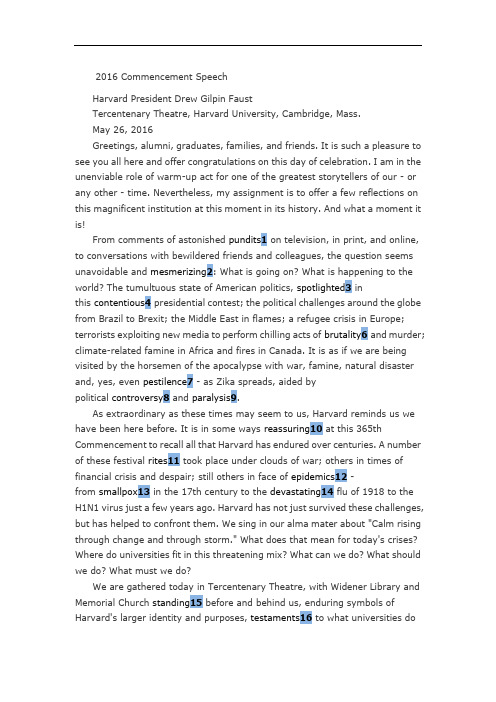
2016 Commencement SpeechHarvard President Drew Gilpin FaustTercentenary Theatre, Harvard University, Cambridge, Mass.May 26, 2016Greetings, alumni, graduates, families, and friends. It is such a pleasure to see you all here and offer congratulations on this day of celebration. I am in the unenviable role of warm-up act for one of the greatest storytellers of our - or any other - time. Nevertheless, my assignment is to offer a few reflections on this magnificent institution at this moment in its history. And what a moment it is!From comments of astonished pundits1 on television, in print, and online, to conversations with bewildered friends and colleagues, the question seems unavoidable and mesmerizing2: What is going on? What is happening to the world? The tumultuous state of American politics, spotlighted3 inthis contentious4 presidential contest; the political challenges around the globe from Brazil to Brexit; the Middle East in flames; a refugee crisis in Europe; terrorists exploiting new media to perform chilling acts of brutality6 and murder; climate-related famine in Africa and fires in Canada. It is as if we are being visited by the horsemen of the apocalypse with war, famine, natural disaster and, yes, even pestilence7 - as Zika spreads, aided bypolitical controversy8 and paralysis9.As extraordinary as these times may seem to us, Harvard reminds us we have been here before. It is in some ways reassuring10 at this 365th Commencement to recall all that Harvard has endured over centuries. A number of these festival rites11 took place under clouds of war; others in times of financial crisis and despair; still others in face of epidemics12 -from smallpox13 in the 17th century to the devastating14 flu of 1918 to theH1N1 virus just a few years ago. Harvard has not just survived these challenges, but has helped to confront them. We sing in our alma mater about "Calm rising through change and through storm." What does that mean for today's crises? Where do universities fit in this threatening mix? What can we do? What should we do? What must we do?We are gathered today in Tercentenary Theatre, with Widener Library and Memorial Church standing15 before and behind us, enduring symbols of Harvard's larger identity and purposes, testaments16 to what universities doand believe at a time when we have never needed them more. And much is at stake, for us and for the world.We look at Widener Library and see a great edifice17, a backdrop of giant columns where photos are taken and 27 steps are worn down ever so slightly by the feet of a century of students and scholars. We also see a repository of learning, with 57 miles of shelving at the heart of a library system of some 17 million books, a monument to reason and knowledge, to the collectionand preservation18 of the widest possible range of beliefs, and experiences, and facts that fuel free inquiry19 and our constantly evolving understanding. A vehicle for Veritas - for exploring the path to truth wherever it may lead. A tribute to the belief that knowledge matters, that facts matter - in the present moment, as a basis for the informed decisions of individuals, societies, and nations; and for the future, as the basis for new insight. As James Madison wrote in 1822, "a people who mean to be their own Governors, must arm themselves with the power that knowledge gives." Or as early 20th-century civil rights activist20 Nannie Helen Burroughs put it, "education is democracy's life insurance."Evidence, reason, facts, logic21, an understanding of history and of science. The ability to know, as former dean Jeremy Knowles used to put it, "when someone is talking rot." These are the bedrock of education, and of an informed citizenry with the capacity to lead, to explore, to invent. Yet this commitment to reason and truth - to their pursuit and preeminence22 - seems increasingly a minority viewpoint. In a recent column, George Will deplored23 the nation's evident abandonment of what he called "the reality principle - the need to assess and adapt to facts." Universities are defined by this principle. We produce a ready stream of evidence and insights, many with potential to create a better world.So what are our obligations when we see our fundamental purpose under siege, our reason for being discounted and undermined? First, we must maintain an unwavering dedication24 to rigorous assessment25 and debate within our own walls. We must be unassailable in our insistence26 that ideas most fully27 thrive and grow when they are open to challenge. Truth cannot simply be claimed; it must be established - even when that process is uncomfortable. Universities do not just store facts; they teach us how to evaluate, test, challenge, and refine them. Only if we ourselves model a commitment to fact over what Stephen Colbert so memorably28 labeled as"truthiness" (and he also actually sometimes called it "Veritasiness!"), only then can we credibly29 call for adherence30 to such standards in public life and in a wider world.We must model this commitment for our students, as we educate them to embrace these principles - in their work here and in the lives they will lead as citizens and leaders of national and international life. We must support and sustain fact and reason beyond our walls as well. And we must do still more.Facing Widener stands Memorial Church. Built in the aftermath of World War I, it was intended to honor and memorialize responsibility - not just the quality of men and women's thoughts, but, as my predecessor31 James Conant put it, "the radiance of their deeds." The more than 1,100 Harvard and Radcliffe students, faculty32, and alumni whose names are engraved33 on its walls gave their lives in service to their country, because they believed that some things had greater value than their own individual lives. I juxtapose Widener Library and Memorial Church today because we need the qualities that both represent, because I believe that reason and knowledge must be inflected with values, and that those of us who are privileged to be part of this community of learning bear consequent responsibilities.Now, it may surprise some of you to hear that this is not an uncontroversial assertion. For this morning's ceremony, I wore the traditional Harvard presidential robe - styled on the garment of a Puritan minister and reminding us of Harvard's origins. Values were an integral part of the defining purpose of the early years of Harvard College, created to educate a learned ministry34. Up until the end of the 1800s, most American college presidents taught a course on moral philosophy to graduating students. But with the rise of the research university in the late nineteenth and early twentieth century, moraland ethical35 purposes came to be seen as at odds36 with the scientific thinking transforming higher education.But in today's world, I believe it is dangerous for universities not to fully acknowledge and embrace their responsibilities to values and to service as well as to reason and discovery. There is no value-free science. There is no algorithm that writes itself. The questions we choose to ask and the research we decide to support; the standards of integrity we expect of our colleagues and students; the community we build and the model we offer: All of this is central to who we are.We can see these values clearly in the choices and passions of our faculty and students: in the motto of Harvard Business School, which you heard this morning uttered by the dean, the commitment to make "a difference in the world." Most of the University would readily embrace this sentiment. In the enthusiasm of students and faculty, we see it as well. From across the University - graduate, professional, and hundreds of undergraduates - we see a remarkable37 enthusiasm, for example, for the field of global health because it unites the power of knowledge and science with a deeply-felt desire to do good in the world - to lead lives of meaning and purpose. Thisspirit animates38 not just global health but so much of all we do. Harvard is and must be a community of idealists. And today, we send thousands of you - doctors, lawyers, teachers, artists, philosophers, business people, epidemiologists, public servants - into the world.For our youngest students, those just beginning to shape their adult lives, those who today received what the ritual language of Commencement calls "their first degree," for them, these questions of values and responsibility take on particular salience. Harvard College is a residential5 community of learning with a goal, in the words of its dean, of personal and social as well as intellectual transformation39. Bringing students of diverse backgrounds to live together and learn from one another enacts40 that commitment, as we work to transform diversity into belonging. In a world divided by difference, we at Harvard strive to be united by it. In myriad41 ways we challenge our students to be individuals of character as well as of learning. We seek to establish standards for the College community that advance our institutional purposes and values. We seek to educate people, not just minds; ourhighest aspiration42 is not just knowledge, but wisdom.Reason and responsibility. Widener and Memorial Church. Harvard and the world. We have a very special obligation in a very difficult time. May we and the students we send forth43 today embrace it. Thank you very much.。
哈佛大学校长德鲁福斯特毕业演讲稿
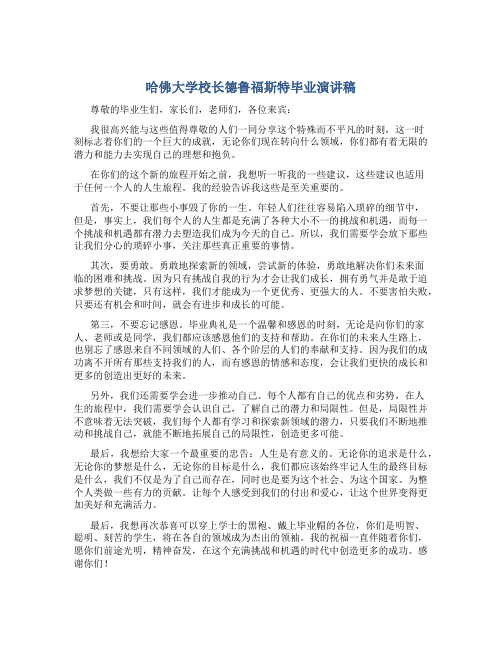
哈佛大学校长德鲁福斯特毕业演讲稿尊敬的毕业生们,家长们,老师们,各位来宾:我很高兴能与这些值得尊敬的人们一同分享这个特殊而不平凡的时刻,这一时刻标志着你们的一个巨大的成就,无论你们现在转向什么领域,你们都有着无限的潜力和能力去实现自己的理想和抱负。
在你们的这个新的旅程开始之前,我想听一听我的一些建议,这些建议也适用于任何一个人的人生旅程。
我的经验告诉我这些是至关重要的。
首先,不要让那些小事毁了你的一生。
年轻人们往往容易陷入琐碎的细节中,但是,事实上,我们每个人的人生都是充满了各种大小不一的挑战和机遇,而每一个挑战和机遇都有潜力去塑造我们成为今天的自己。
所以,我们需要学会放下那些让我们分心的琐碎小事,关注那些真正重要的事情。
其次,要勇敢。
勇敢地探索新的领域,尝试新的体验,勇敢地解决你们未来面临的困难和挑战。
因为只有挑战自我的行为才会让我们成长,拥有勇气并是敢于追求梦想的关键,只有这样,我们才能成为一个更优秀、更强大的人。
不要害怕失败,只要还有机会和时间,就会有进步和成长的可能。
第三,不要忘记感恩。
毕业典礼是一个温馨和感恩的时刻,无论是向你们的家人、老师或是同学,我们都应该感恩他们的支持和帮助。
在你们的未来人生路上,也别忘了感恩来自不同领域的人们、各个阶层的人们的奉献和支持。
因为我们的成功离不开所有那些支持我们的人,而有感恩的情感和态度,会让我们更快的成长和更多的创造出更好的未来。
另外,我们还需要学会进一步推动自己。
每个人都有自己的优点和劣势,在人生的旅程中,我们需要学会认识自己,了解自己的潜力和局限性。
但是,局限性并不意味着无法突破,我们每个人都有学习和探索新领域的潜力,只要我们不断地推动和挑战自己,就能不断地拓展自己的局限性,创造更多可能。
最后,我想给大家一个最重要的忠告:人生是有意义的。
无论你的追求是什么,无论你的梦想是什么,无论你的目标是什么,我们都应该始终牢记人生的最终目标是什么,我们不仅是为了自己而存在,同时也是要为这个社会、为这个国家、为整个人类做一些有力的贡献。
哈佛大学校长的告别演讲(中英对照)
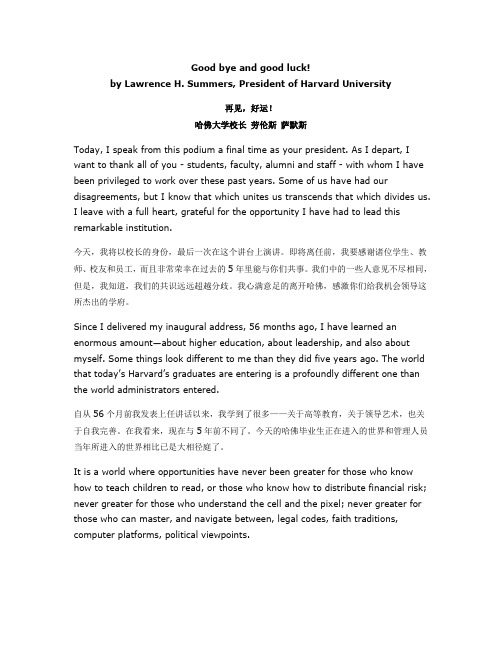
Good bye and good luck!by Lawrence H. Summers, President of Harvard University再见,好运!哈佛大学校长劳伦斯萨默斯Today, I speak from this podium a final time as your president. As I depart, I want to thank all of you - students, faculty, alumni and staff - with whom I have been privileged to work over these past years. Some of us have had our disagreements, but I know that which unites us transcends that which divides us.I leave with a full heart, grateful for the opportunity I have had to lead this remarkable institution.今天,我将以校长的身份,最后一次在这个讲台上演讲。
即将离任前,我要感谢诸位学生、教师、校友和员工,而且非常荣幸在过去的5年里能与你们共事。
我们中的一些人意见不尽相同,但是,我知道,我们的共识远远超越分歧。
我心满意足的离开哈佛,感激你们给我机会领导这所杰出的学府。
Since I delivered my inaugural address, 56 months ago, I have learned an enormous amount—about higher education, about leadership, and also about myself. Some things look different to me than they did five years ago. The world that today’s Harvard’s graduates are entering is a profoundly different one than the world administrators entered.自从56个月前我发表上任讲话以来,我学到了很多——关于高等教育,关于领导艺术,也关于自我完善。
哈佛大学毕业典礼校长演讲稿
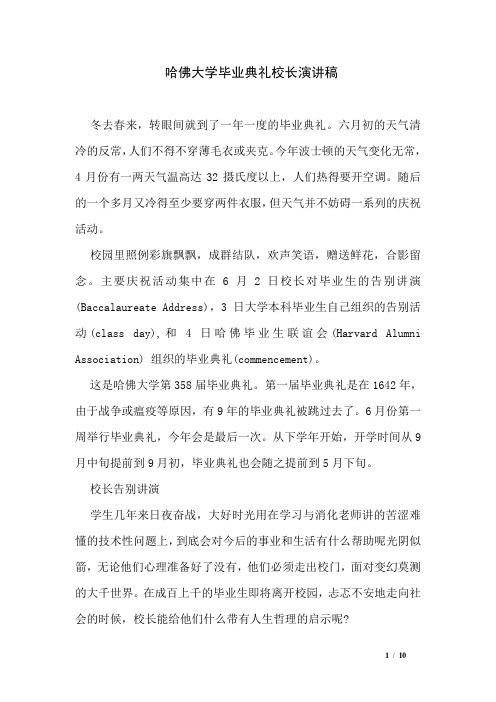
哈佛大学毕业典礼校长演讲稿冬去春来,转眼间就到了一年一度的毕业典礼。
六月初的天气清冷的反常,人们不得不穿薄毛衣或夹克。
今年波士顿的天气变化无常,4月份有一两天气温高达32摄氏度以上,人们热得要开空调。
随后的一个多月又冷得至少要穿两件衣服,但天气并不妨碍一系列的庆祝活动。
校园里照例彩旗飘飘,成群结队,欢声笑语,赠送鲜花,合影留念。
主要庆祝活动集中在6月2日校长对毕业生的告别讲演(Baccalaureate Address),3日大学本科毕业生自己组织的告别活动(class day),和4日哈佛毕业生联谊会(Harvard Alumni Association) 组织的毕业典礼(commencement)。
这是哈佛大学第358届毕业典礼。
第一届毕业典礼是在1642年,由于战争或瘟疫等原因,有9年的毕业典礼被跳过去了。
6月份第一周举行毕业典礼,今年会是最后一次。
从下学年开始,开学时间从9月中旬提前到9月初,毕业典礼也会随之提前到5月下旬。
校长告别讲演学生几年来日夜奋战,大好时光用在学习与消化老师讲的苦涩难懂的技术性问题上,到底会对今后的事业和生活有什么帮助呢光阴似箭,无论他们心理准备好了没有,他们必须走出校门,面对变幻莫测的大千世界。
在成百上千的毕业生即将离开校园,忐忑不安地走向社会的时候,校长能给他们什么带有人生哲理的启示呢?6月2日下午的校长告别讲演照例在校园中心的纪念教堂(Memorial Church)举行。
虽然是大庭广众之下的书面发言,但并不完全是冠冕堂皇的做秀,其中不乏肺腑之言。
校长福斯特(Drew Gilpin Faust)首先回忆了这批毕业生在过去四年的经历。
她说,你们进入校园时正好是卡特里亚娜(Katrina)台风肆虐的时候,你们离开校园时正好是经济风暴席卷全球,改变这个国家和世界的时候。
你们也目睹了哈佛的变化。
你们在四年中经历了三位校长(萨默斯,代校长巴克( Derek Bok),和福斯特本人),你们经历了旧的教学大纲(Core Curriculum)的退出和新的教学大纲的引入(General Education),和一些校舍的变化。
何江在哈佛大学2016毕业典礼上的演讲(中英版+个人简介)
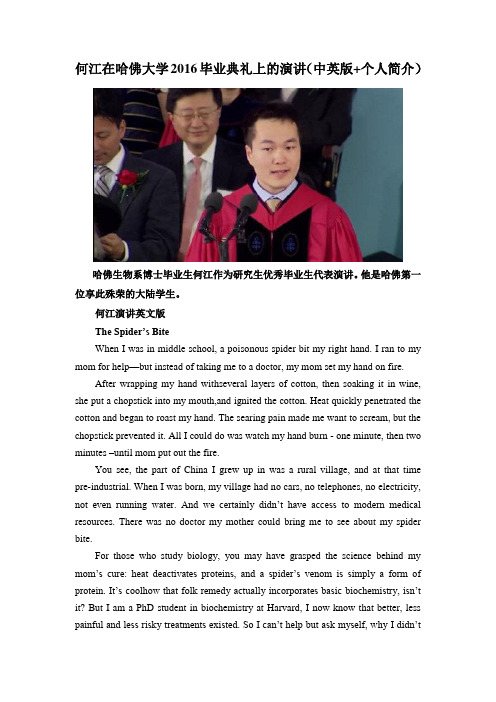
何江在哈佛大学2016毕业典礼上的演讲(中英版+个人简介)哈佛生物系博士毕业生何江作为研究生优秀毕业生代表演讲。
他是哈佛第一位享此殊荣的大陆学生。
何江演讲英文版The Spider’s BiteWhen I was in middle school, a poisonous spider bit my right hand. I ran to my mom for help—but instead of taking me to a doctor, my mom set my hand on fire.After wrapping my hand withseveral layers of cotton, then soaking it in wine, she put a chopstick into my mouth,and ignited the cotton. Heat quickly penetrated the cotton and began to roast my hand. The searing pain made me want to scream, but the chopstick prevented it. All I could do was watch my hand burn - one minute, then two minutes –until mom put out the fire.You see, the part of China I grew up in was a rural village, and at that time pre-industrial. When I was born, my village had no cars, no telephones, no electricity, not even running water. And we certainly didn’t have access to modern medical resources. There was no doctor my mother could bring me to see about my spider bite.For those who study biology, you may have grasped the science behind my mom’s cure: heat deactivates proteins, and a spider’s venom is simply a form of protein. It’s coolhow that folk remedy actually incorporates basic biochemistry, isn’t it? But I am a PhD student in biochemistry at Harvard, I now know that better, less painful and less risky treatments existed. So I can’t help but ask myself, why I didn’treceive oneat the time?Fifteen years have passed since that incident. I am happy to report that my hand is fine. But this question lingers, and I continue to be troubled by the unequal distribution of scientific knowledge throughout the world. We have learned to edit the human genome and unlock many secrets of how cancer progresses. We can manipulate neuronal activity literally with the switch of a light. Each year brings more advances in biomedical research-exciting, transformative accomplishments. Yet, despite the knowledge we have amassed, we haven’t been so successful in deploying it to where it’s needed most. According to the World Bank, twelve percent of the world’s population lives on less than $2 a day. Malnutrition kills more than 3 million children annually. Three hundred million peopleare afflicted by malaria globally. All over the world, we constantly see these problems of poverty, illness, and lack of resources impeding the flow of scientific information. Lifesaving knowledge we take for granted in the modern world is often unavailable in these underdeveloped regions.And in far too many places, people are still essentially trying to cure a spider bite with fire.While studying at Harvard, I saw how scientific knowledge can help others in simple, yet profound ways. The bird flu pandemic in the 2000s looked to my village like a spell cast by demons. Our folk medicine didn’t even have half-measures to offer. What’s more, farmers didn’t know the difference between common cold and flu; they didn’t understand that the flu was much more lethal than the common cold. Most people were also unaware that the virus could transmit across different species.So when I realized that simple hygiene practices like separating different animal species could contain the spread of the disease, and that I could help make this knowledge available to my village, that was my first “Aha” moment as a budding scientist. But it was more than that: it was also a vital inflection point in my own ethical development, my own self-understanding as a member of the global community.Harvard dares us to dream big, to aspire to change the world. Here on this Commencement Day, we are probably thinking of grand destinations and big adventures that await us. As for me, I am also thinking of the farmers in my village. My experiencehere reminds me how important it is for researchersto communicateour knowledge to those who need it. Because by using the sciencewe already have, wecould probably bring my village and thousands like it into the world you and I take for granted every day. And that’s an impact every one of us can make!But the question is, will we make the effort or not?More than ever before,our society emphasizes science and innovation. But an equally important emphasis should be on distributing the knowledge we have to where it’s needed. Changing the world doesn’t mean thateveryone has to find the next big thing. It can be as simple as becoming better communicators, and finding more creative ways to pass on the knowledge we have to people like my mom and the farmers in their local community. Our society also needs to recognize that the equal distribution of knowledge is a pivotal step of human development, and work to bring this into reality.And if we do that, then perhaps a teenager in rural China who is bitten by a spider will not have to burn his hand, but will know to seek a doctor instead.在我读初中的时候,有一次,一只毒蜘蛛咬伤了我的右手。
- 1、下载文档前请自行甄别文档内容的完整性,平台不提供额外的编辑、内容补充、找答案等附加服务。
- 2、"仅部分预览"的文档,不可在线预览部分如存在完整性等问题,可反馈申请退款(可完整预览的文档不适用该条件!)。
- 3、如文档侵犯您的权益,请联系客服反馈,我们会尽快为您处理(人工客服工作时间:9:00-18:30)。
哈佛校长2016年毕业典礼演讲Greetings, alumni, graduates, families, and friends. It is such a pleasure to see you all he re and offercongratulations on this day of celebration. I am in the unenviable role of war m-up act for one ofthe greatest storytellers of our - or any other - time. Nevertheless, m y assignment is to offer a fewreflections on this magnificent institution at this moment in its history. And what a moment it is!From comments of astonished pundits on television, in print, and online, to conversations withbewildered friends and colleagues, the question seems unavoidable and mesmerizin g: What is goingon? What is happening to the world? The tumultuous state of American politics, spotlighted in thiscontentious presidential contest; the political challenges around the globe from Brazil to Brexit; theMiddle East in flames; a refugee crisis in Europe; terr orists exploiting new media to perform chillingacts of brutality and murder; climate-relate d famine in Africa and fires in Canada. It is as if we arebeing visited by the horsemen of t he apocalypse with war, famine, natural disaster and, yes, evenpestilence - as Zika sprea ds, aided by political controversy and paralysis.As extraordinary as these times may seem to us, Harvard reminds us we have been here before. Itis in some ways reassuring at this 365th Commencement to recall all that Harv ard has enduredover centuries. A number of these festival rites took place under clouds of war; others in times offinancial crisis and despair; still others in face of epidemics - fro m smallpox in the 17th century tothe devastating flu of 1918 to the H1N1 virus just a fe w years ago. Harvard has not just survivedthese challenges, but has helped to confront t hem. We sing in our alma mater about "Calm risingthrough change and through storm." What does that mean for today's crises? Where douniversities fit in this threatening mix? What can we do? What should we do? What must we do?We are gathered today in Tercentenary Theatre, with Widener Library and Memorial Chu rchstanding before and behind us, enduring symbols of Harvard's larger identity and pur poses,testaments to what universities do and believe at a time when we have never nee ded them more.And much is at stake, for us and for the world.We look at Widener Library and see a great edifice, a backdrop of giant columns where p hotos aretaken and 27 steps are worn down ever so slightly by the feet of a century of st udents andscholars. We also see a repository of learning, with 57 miles of shelving at the heart of a librarysystem of some 17 million books, a monument to reason and knowledg e, to the collection andpreservation of the widest possible range of beliefs, and experienc es, and facts that fuel free inquiryand our constantly evolving understanding. A vehicle fo r Veritas - for exploring the path to truthwherever it may lead. A tribute to the belief that knowledge matters, that facts matter - in thepresent moment, as a basis for the informed decisions of individuals, societies, and nations; and forthe future, as the basis for new i nsight. As James Madison wrote in 1822,"a people who mean tobe their own Governors, must arm themselves with the power tha t knowledge gives." Or as early20th-century civil rights activist Nannie Helen Burroughs p ut it, "education is democracy's lifeinsurance."Evidence, reason, facts, logic, an understanding of history and of science. The ability to k now, asformer dean Jeremy Knowles used to put it,"when someone is talking rot." These are the bedrockof education, and of an informed ci tizenry with the capacity to lead, to explore, to invent. Yet thiscommitment to reason and truth - to their pursuit and preeminence - seems increasingly aminority viewpoint. In a r ecent column, George Will deplored the nation's evident abandonment ofwhat he called " the reality principle - the need to assess and adapt to facts." Universities are definedby t his principle. We produce a ready stream of evidence and insights, many with potential t ocreate a better world.So what are our obligations when we see our fundamental purpose under siege, our reas on forbeing discounted and undermined? First, we must maintain an unwavering dedicati on to rigorousassessment and debate within our own walls. We must be unassailable in o ur insistence that ideasmost fully thrive and grow when they are open to challenge. Trut h cannot simply be claimed; itmust be established - even when that process is uncomfort able. Universities do not just storefacts; they teach us how to evaluate, test, challenge, a nd refine them. Only if we ourselves model acommitment to fact over what Stephen Colb ert so memorably labeled as "truthiness"(and he alsoactually sometimes called it "Veritasiness!"), only then can we credibly call fo r adherence to suchstandards in public life and in a wider world.We must model this commitment for our students, as we educate them to embrace these principles - in their work here and in the lives they will lead as citizens and leaders of nati onal andinternational life. We must support and sustain fact and reason beyond our walls as well. And wemust do still more.Facing Widener stands Memorial Church. Built in the aftermath of World War I, it was int ended tohonor and memorialize responsibility - not just the quality of men and women's thoughts, but, asmy predecessor James Conant put it,"the radiance of their deeds." The more than 1,100 Harvardand Radcliffe students, facult y, and alumni whose names are engraved on its walls gave their livesin service to their c ountry, because they believed that some things had greater value than theirown individu al lives. I juxtapose Widener Library and Memorial Church today because we need thequ alities that both represent, because I believe that reason and knowledge must be inflected withvalues, and that those of us who are privileged to be part of this community of lear ning bearconsequent responsibilities.Now, it may surprise some of you to hear that this is not an uncontroversial assertion. Fo r thismorning's ceremony, I wore the traditional Harvard presidential robe - styled on the garment of aPuritan minister and reminding us of Harvard's origins. Values were an inte gral part of the definingpurpose of the early years of Harvard College, created to educate a learned ministry. Up until theend of the 1800s, most American college presidents taug ht a course on moral philosophy tograduating students. But with the rise of the research university in the late nineteenth and earlytwentieth century, moral and ethical purposes c ame to be seen as at odds with the scientificthinking transforming higher education. But in today's world, I believe it is dangerous for universities not to fully acknowledge an d embracetheir responsibilities to values and to service as well as to reason and discover y. There is no value-free science. There is no algorithm that writes itself. The questions we choose to ask and theresearch we decide to support; the standards of integrity we ex pect of our colleagues andstudents; the community we build and the model we offer: All of this is central to who we are.We can see these values clearly in the choices and passions of our faculty and students: i n themotto of Harvard Business School, which you heard this morning uttered by the dea n, thecommitment to make "a difference in the world." Most of the University would read ily embrace thissentiment. In the enthusiasm of students and faculty, we see it as well. F rom across the University- graduate, professional, and hundreds of undergraduates - we see a remarkable enthusiasm, forexample, for the field of global health because it unites the power of knowledge and science with adeeply-felt desire to do good in the world - to lead lives of meaning and purpose. This spiritanimates not just global health but so muc h of all we do. Harvard is and must be a community ofidealists. And today, we send thou sands of you - doctors, lawyers, teachers, artists, philosophers,business people, epidemio logists, public servants - into the world.For our youngest students, those just beginning to shape their adult lives, those who tod ayreceived what the ritual language of Commencement calls "their first degree," for them , thesequestions of values and responsibility take on particular salience. Harvard College i s a residentialcommunity of learning with a goal, in the words of its dean, of personal an d social as well asintellectual transformation. Bringing students of diverse backgrounds to live together and learnfrom one another enacts that commitment, as we work to transfo rm diversity into belonging. In aworld divided by difference, we at Harvard strive to be u nited by it. In myriad ways we challengeour students to be individuals of character as we ll as of learning. We seek to establish standards forthe College community that advanceour institutional purposes and values. We seek to educatepeople, not just minds; our hig hest aspiration is not just knowledge, but wisdom.Reason and responsibility. Widener and Memorial Church. Harvard and the world. We ha ve a veryspecial obligation in a very difficult time. May we and the students we send fort h today embrace it.Thank you very much.。
